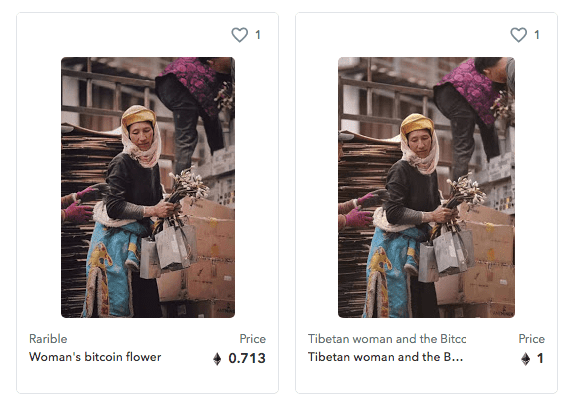Non-fungible tokens have been praised as a boon for artists, at least for now. But as copycats mint and market NFTs derived from content that’s not theirs to sell, concerns have emerged over the technology’s potential to facilitate intellectual property theft.
Caixin, a respected Chinese financial and business news outlet, appears to be one of the thieves’ latest victims.
A photo shot by Caixin photojournalist Ding Gang featuring a Tibetan woman carrying components of crypto mining machines this week went viral on the Chinese internet, with netizens praising its aesthetics and news significance.
Some individuals were quick to mint dozens of NFTs, replicating or recreating Caixin’s viral photo and putting them up for sale on NFT trading platform OpenSea, an act that appeared to have infringed the rights of the photo’s owner. One of the NFTs was listed for as much as 2,021 ETH (US$3.9 million), although it was later sold for just 0.1 ETH.
Chinese crypto blogger Wu Blockchain commented on the matter in a tweet on Tuesday, saying: “We should condemn this behavior. The copyright of this picture belongs to Caixin and reporter Ding Gang, and the consent of the characters in the picture is required for commercial use.”
The episode is not the only recent controversy surrounding questionable NFTs.
The Chinese agent of famous Mando-pop singer David Tao last Friday released a statement on social media condemning iBox NFT, a platform incubated by Huobi, over suspicions it had illegally sold NFTs made from images of Tao without permission.
“Our company did not authorize or partner with any entity for creating NFT products based on the name and images of David Tao,” the agent said in the statement, adding that it had reached out to the platform and asked it to take down the NFTs and other promotional information that it alleged had infringed Tao’s legal rights.
However, as of press time, NFTs linked to Tao were still on sale on iBox, and another batch of 10,000 copies of Tao-related NFTs is expected to go on sale later this week. The iBox platform did not respond to a request for comment by Forkast.News.
Justine Lu, co-founder and CEO of Taiwan-based NFT marketplace Lootex, told Forkast.News that she wouldn’t say NFTs protected plagiarism, because “it happens in our daily lives, regardless of NFTs.”
“However, as a marketplace, it’s important to discuss how we could prevent this kind of behavior,” Lu added.
Lu said that her company had encountered a similar situation before. A slew of NFTs specifically minted for sales on Lootex were replicated by unknown individuals and put up for sale on OpenSea.
“We reached out to OpenSea and they took down those NFTs right away,” Lu said, adding that it could be hard to track down those responsible as they were anonymous and platforms wouldn’t possess personal information on sellers and buyers.
One of the approaches courts often take to identify authenticity in intellectual property cases is to ask artists to show their drafts from the creative process, according to Lu.
“What [NFT platforms] could do now is to clearly spell out terms in user agreements,” she said.
DeFiChain Chief Technical Officer U-Zyn Chua, one of the first people in Southeast Asia to peer-review the original Bitcoin white paper, told Forkast.News that the trading of some NFTs at high prices would naturally attract people who could try to copy them.
“There have been some incidents where you have two competing NFTs for the same piece of art. You don’t even know which one is the legit one,” he said.
Chua said that some tech companies were attempting to embed some sort of chip within pieces of real-world art to verify that certain NFTs belonged to certain artworks.
“But even [by doing] that, it doesn’t deter copying outright, because if it’s a physical piece, you can always duplicate another one,” he said.





